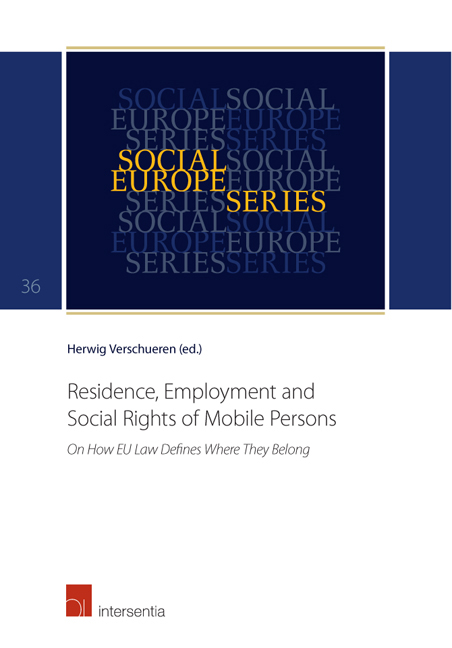Book contents
- Frontmatter
- Preface
- Contents
- List of Abbreviations
- List of Contributors
- Chapter 1 How EU Law Defines where Mobile Persons Belong. An Introduction
- Chapter 2 Family as Link. Explaining the Judicial Change of Direction on Residence Rights of Family Members from Third States
- Chapter 3 The Direction of the Court's Family Reunification Case-Law. A Plea for (Timely) Moderation
- Chapter 4 Sufficient Resources and Residence Rights under Directive 2004/38
- Chapter 5 Free Movement of Persons and European Solidarity. A Melancholic Eulogy
- Chapter 6 Once a Foreigner, Always a Foreigner. Who Does Not Belong Here Anymore? Expulsion Measures
- Chapter 7 Who Does Not Belong Here Anymore? A Statistical Snapshot of Member States’ Practices
- Chapter 8 Civic Integration Exams in EU Immigration Law. What Integration is Not in European Law
- Chapter 9 I Study Here, and Thus I Belong? Mobile Students in the European Union
- Chapter 10 Being Economically Active: How It Still Matters
- Chapter 11 Where Do EU Mobile Workers Belong, According to Rome I and the (E)PWD?
- Chapter 12 Conflicting Rules of Conflict: Social Security and Labour Law
- Chapter 13 Conflicting Rules of Conflict: Social Security and Labour Law. A Response
- Chapter 14 Where Does the UK Belong?
Chapter 2 - Family as Link. Explaining the Judicial Change of Direction on Residence Rights of Family Members from Third States
Published online by Cambridge University Press: 22 September 2018
- Frontmatter
- Preface
- Contents
- List of Abbreviations
- List of Contributors
- Chapter 1 How EU Law Defines where Mobile Persons Belong. An Introduction
- Chapter 2 Family as Link. Explaining the Judicial Change of Direction on Residence Rights of Family Members from Third States
- Chapter 3 The Direction of the Court's Family Reunification Case-Law. A Plea for (Timely) Moderation
- Chapter 4 Sufficient Resources and Residence Rights under Directive 2004/38
- Chapter 5 Free Movement of Persons and European Solidarity. A Melancholic Eulogy
- Chapter 6 Once a Foreigner, Always a Foreigner. Who Does Not Belong Here Anymore? Expulsion Measures
- Chapter 7 Who Does Not Belong Here Anymore? A Statistical Snapshot of Member States’ Practices
- Chapter 8 Civic Integration Exams in EU Immigration Law. What Integration is Not in European Law
- Chapter 9 I Study Here, and Thus I Belong? Mobile Students in the European Union
- Chapter 10 Being Economically Active: How It Still Matters
- Chapter 11 Where Do EU Mobile Workers Belong, According to Rome I and the (E)PWD?
- Chapter 12 Conflicting Rules of Conflict: Social Security and Labour Law
- Chapter 13 Conflicting Rules of Conflict: Social Security and Labour Law. A Response
- Chapter 14 Where Does the UK Belong?
Summary
RECONSTRUCTING FREE MOVEMENT AND UNION CITIZENSHIP
Rules on free movement and Union citizenship have always had a predilection towards progressive change. This inherent dynamism reflects the general tendency of the EU to rely on an ongoing process of transformative integration through law and corresponds to the historic weight of invocations of ‘citizenship’ during earlier struggles for political reform and social inclusion. Within the confines of EU law, rules on citizenship and free movement have evolved considerably over the past decades. This process was driven by Treaty changes or legislative amendments at some points, while Court judgments took the helm at other moments. The first section of this contribution presents the methodological foundations upon which our enquiry rests (see below 1.1) and shows the significance of our object of study: residence rights of family members, in particular those from third states (see below 1.2).
EVOLUTION OF LEGAL RULES
There was and remains nothing inevitable in the evolution of Union citizenship and free movement. It will be demonstrated later that the original Treaty regime established a framework the legislature had to fill with substance in the 1960s. On this basis, the Court of Justice embarked upon the construction of doctrinal figures for free movement, which it applied to family reunion later. Luxembourg's case-law embraced a variety of different scenarios reflecting the complexity of free movement rules whose interpretation was inspired by the subsequent introduction of Union citizenship which the Court famously considered being ‘destined to be [a] fundamental status.’
Union citizenship can be understood as an overarching idea supporting the search for coherent solutions for family reunion in the diverse scenarios discussed below. This would establish the citizenship paradigm as the fixed star guiding the resolution of legal questions, reflecting the desire of the legislature to remedy the ‘sector-by-sector, piecemeal approach to the right of free movement.’ Even where such status convergence happens, change cannot be expected to be linear. Instead, it will often present a process of stratification when different layers supplement and influence each other. Such evolution may result in gradual approximation, but it can also cause frictions or contradictions when later events have a transformative impact upon earlier developments – and vice versa.
- Type
- Chapter
- Information
- Residence, Employment and Social Rights of Mobile PersonsOn How EU Law Defines Where They Belong, pp. 11 - 38Publisher: IntersentiaPrint publication year: 2016

